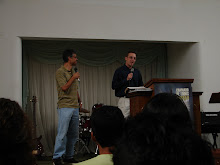When think about the leaders in the church 2 types come to mind pastoral and administrative. A pastoral leader is one who is in charge of growing and developing the church and the administrative is in charge of meeting the needs of the church. But one is not better than the other based on the role that is being played. Philippians 2:19-30 gives a good description of what each of these leaders looks like. Paul and timothy would be examples of a pastoral leader and Epaphroditus would be the administrative one. It is interesting to see how Paul describes the two. He places them on the same field. Both are equally necessary and important. I would like to point out some key points about both from this passage.
The Pastoral Leader
We as leaders should have some type of desire to send out workers to do the work of the Lord. Our hope to fulfill this role is found in the will of the Lord.
i. Christ’s plans and purposes are center.
ii. Everything that we do must be centered in Christ.
iii. Your desire is that it would be the Lord’s desire also.
iv. The question you ask to figure that out is; would God approve of this?
Our sending people out is not just for the good of the people but for our own good.
i. The workers will be a blessing because they will be able to assess situations and bring about resolve to problems
ii. Seeing the fruit within your ministry is a great encouragement.
iii. We need to be looking for the growth and development in the church.
iv. We need to be looking to assess problems and needs and address them.
We need to assure those whom you are sending workers to, that they are qualified. The needs of the church must be handled in a genuine manner.
i. You must qualify yourself as a shepherd of the flock.
ii. The needs of the church are not subordinate to your own desires.
Most people do not qualify as a true shepherd to the flock.
i. They lack the right spirit.
ii. They look out for their own desires.
iii. They lack a self-sacrificial attitude.
iv. They only help when Christ’s gain is compatible with theirs
v. They don’t have genuine unselfish devotion to the church.
vi. They use God’s gifts for their own advancement.
vii. They are unfit to carry out the task.
We must prove ourselves worthy of this task.
i. We need to be focused and withstand the test of character.
ii. Our virtue will show us approved.
As soon as everything is in place is the time when we send those who have shown themselves approved.
i. You must be strategic in the use of workers.
ii. Even in the face of trouble we must not be completely focused on our own situations.
iii. Paul was in prison facing the death penalty and was still looking for the “right time” to send Timothy.
We as leaders have to have the desire to go out and do the work of the Lord. We don’t just send those who have shown themselves approved, we go too.
i. Once you have established yourself some where does not mean that you detach yourself from everything else you have done.
ii. We are one family that needs to be looking out for each other regardless of distance between locations.
iii. The Lord’s will and permission should be the determining factor of whether we act.
iv. The work of the Lord does not start and end in your church.
v. You are the example to those under you and they are to model what you do. This is the core essence of discipleship.
The Administrative Leader
Sees or hears about a need in the church and steps up to get it done.
i. This does not make them any less important.
ii. They are described as brothers. They are part of this adopted family.
iii. They are on the same team working for the same goal but with a different responsibility.
iv. They are soldiers on the front lines.
v. They have been gifted to minister to specific needs and perform special services within the church.
Even in the task of serving the church there will be opposition.
i. Simple service to the church will bring hardship.
ii. We have been stopped several times by police because we were handing out water bottles for free on the street corner.
iii. But God is faithful to those in service to Him and will have mercy on them.
God’s mercy is not isoltaed to pastoral leaders. It encompasses many.
i. It brought mercy upon Epaphroditus
ii. It brought mercy upon Paul.
iii. It brought mercy upon the church.
How do we respond to workers when they return from their task?
i. We are to rejoice in the Lord.
ii. We are to hold them in high regard.
Because they have risked their life for the service of the church and because the church had a need that they could not fulfill and the worker stepped up to fulfill it.
So the question is this. Who are the Timothy's and Epaphroditus' in your ministry? If you cannot think of anyone, then i would like to know what you are going to do about it?
Thursday, August 13, 2009
Subscribe to:
Post Comments (Atom)

No comments:
Post a Comment